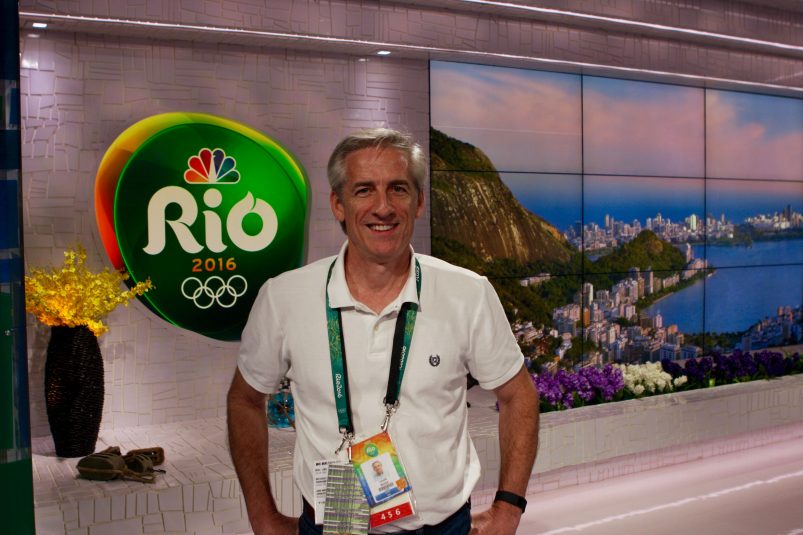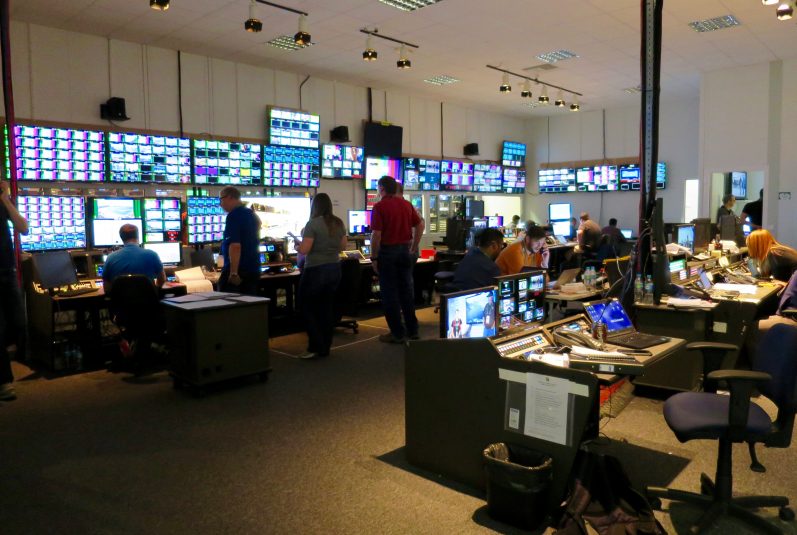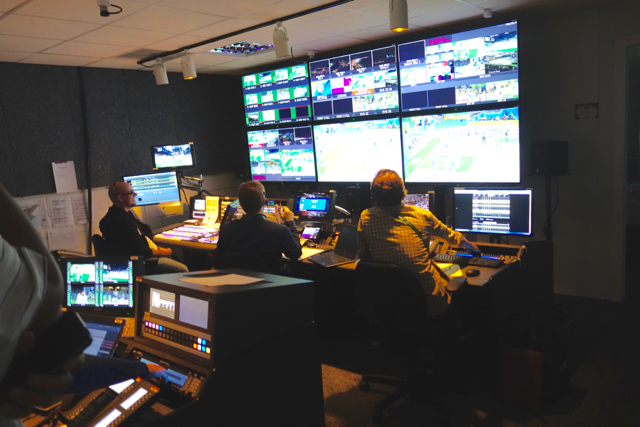Live from Rio: David Mazza Discusses How NBC Olympics Team Finds Games Groove
The 2016 Summer Olympics in Rio are now in day six and historically for NBC Olympics that means that the team is just now settling into its grove as the sheer amount of moving parts that have to be put through their paces at the IBC and the venues settle into place. But this year’s effort has been a bit different thanks to a combination of pre-planning, contingency workflows, and, perhaps most of all, veteran leadership. “This is the hardest games we have done to date and has been the most challenging effort before an Opening Ceremony we have had anywhere,” says David Mazza, NBC Sports Group and NBC Olympics SVP and CTO.

Dave Mazza says the NBC Olympics production team was able to get to full speed quicker than usual this year.
Ironically, Mazza quickly adds that as difficult as it was getting things in line for the Opening Ceremony, the entire operation was able to smooth out any of the typical early kinks a full day and a half earlier than usual.
“It smoothed out much sooner than in recent history as by 3 p.m. on Sunday afternoon things were going well,” says Mazza. “So right now we’re quite happy.”
The build out at the IBC was also smoother than it has been in the past six Olympics as Mazza credits OBS’s decision to put a huge amount of time, effort, and money into building a transportable wall system.
“We reaped the benefit big time as it was the first time in a long time that we arrived on the date we were supposed to with our racks and wiring and the IBC was ready,” says Mazza. “The walls were up, it was clean, and there was no dust so we only had to worry about our own stuff and not the walls or power that wasn’t installed. So that’s a huge credit to OBS.”
The steps taken by OBS were complemented by NBC Olympics’ veteran leadership and experience the NBC Olympics team has built over the years. First, the team knew there might be possible logistical and power delays that could cause some hiccups in the weeks ahead of the games.
“We did a lot of pre-fabrication and testing in the U.S. so that when equipment arrived here it was ready to go,” says Mazza.
But most importantly, the team is ready for just about anything as they pretty much have experienced everything over the years. The veteran leadership has made a big difference on the 25 productions that typically have smaller crews and require problems to be solved via creativity and innovation.
“I couldn’t be happier with where we are and it’s a testament to the team that we are fortunate enough to have assembled, that even as the complexity of the show grows each games, they all grasped the changes and things smoothed out quickly,” says Mazza.
“And we’re lucky enough to bring back many of the same ops/engineering folks that are familiar with the many weird ways that we have had to invent in order to cover the small venues.”
Veteran leadership also meant the team was well versed in the possible challenges related to logistics, power, and even venue and IBC design that can trip up any production at any time.
One of those emergency situations happened on the second day of the Olympics when one of the two power generators at the Beach Volleyball venue on Copacabana Beach went down prior to primetime coverage. The NBC unilateral operation had to run off of one generator until a new one was allowed to be brought in at 3 a.m. and up and running a couple hours later.
“We had to get through primetime so we sent some tieline codecs out there so that if the generator failed we could get the commentary from the announce booth back to the IBC and then drop it on top of the host video feed from the venue,” says Mazza.
Flipping the Switch
Mazza says the days leading up to the Opening Ceremony can be terrifying at times because only 10 days prior to the start of action, not a single of NBC’s remote production units was on site. And while that was the plan, it still doesn’t mean waiting is not without its own set of stress.

The NBC Olympics Broadcast Operations Center is a beehive of activity all day long.
“The IBC was running happily and everything was all pre-staged and ready to deploy, but with the trucks not there till so late it still is very unnerving,” says Mazza. “And then as you go into the countdown of that week there is a massive amount of activity getting the trucks up and running at the venues.”
The stress was compounded prior to the start of the Games when the one of the primary 10 Gbps circuit to the U.S. was rerouted adding some more latency to the signal as well as noise.
“And then the next morning the B and C circuits went out an hour before the Today Show was going on air,” recalls Mazza. “So things like the trucks arriving and access to the venues can be nerve wracking, while things like the 10 Gbps circuits disappearing can be terrifying.”
The Live Advantage
It’s been more than 20 years since an Olympic Games has lined up time zone wise with the East Coast of the United States and that means that there is plenty of truly live production being offered up by the NBC Olympics team. And that is just the way Mazza likes it.
“Everybody in our industry performs better when you’re live because that’s what everyone is used to and you know you only have one shot to get it right,” he explains. “And like anything in life, if you have the option to redo something then it causes people to rethink, change their mind, and be overly critical. So live is better on all fronts as you don’t have hours and hours to re-edit, rethink, and readjust. You obviously can’t control the flow of the show as well, but everyone in our business performs better live. It’s more fun reacting to live stuff.”
That isn’t to say that there isn’t plenty of editing still being done in Rio and back home in Stamford. Every edit system is performing at peak output creating not only athlete profiles and other packages but also repackaging events like gymnastics and diving. Gymnastic has up to six concurrent events going on at the same time so truly live coverage is out of the question.
And diving, for example, makes use of EVS Multireview technology to bring shots back to the IBC from so that the production team can pull up the dive they want and also have access to other shots that can be used to bridge the gap in and out of replays. With Multireview the team at the IBC can look right into the EVS servers inside the truck at the venue without disturbing venue operations.
The IBC Evolution
One new technical addition to the NBC Olympics Rio operations is Control Room X which is used for events like marathon, cycling, and triathlon.
“We used to have a small truck that would hopscotch from venue to venue but now we have two Lawo kits that can move four feeds each back to our facility over 1 Gigabit connection or, in the case of the marathon, eight feeds via both plus two satellite feeds to give us 10 feeds,” says Mazza. “But we get much higher utilization out of it because we can make use of the IBC router and graphics that are here and keep the complexity at the IBC.”

Control Room X at the IBC is being used to produce a number of sports, including women’s basketball, remotely.
Over the past 10 years the NBC Olympics team located at the actual event has been fairly steady in terms of physical space and also number of personnel. But the amount of content being offered out to viewers in the United States has increased by multiples. Much of that growth can be credited to an ever-growing team of NBC Olympic staffers in the U.S. as this year more than 1,100 people are working in NBC Sports broadcast facility in Stamford, CT.
“In 2006 we trialed doing the curling events at home with 12 people and that successful effort became 500 people in China ’08 and the creation of the Off Tube Factory,” says Mazza. “That then grew to 600 at the 2012 London Olympics and then to 1,100 this year complete with eight control rooms in Stamford and then one at Golf Channel in Orlando and a 10th at Telemundo in Miami.
“Parts of the plant in Rio are more complicated to support the people at home, so it might look much the same here, but there is a lot of engineering and routing being done to support those at-home efforts,” says Mazza. “I am amazed at the complexity level required for integrating the two plants, it is off-the-charts when you take the scale into account.”
